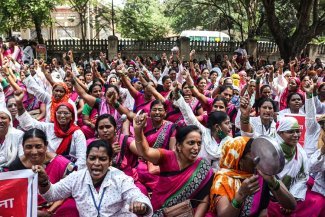We know that workers are on the frontline of multiple and extraordinary crises: inequality at historic levels, the climate emergency, a pandemic that is destroying lives and livelihoods, conflicts with devastating domestic and global impacts.
The 2022 ITUC Global Rights Index exposes how this instability is being exploited by too many governments and employers to attack workers’ rights. The index shows the scale of this and the human cost.
We must expose the wrongdoing to make governments realise they have to rebuild with a new social contract – jobs, wages, rights, social protection, equality and inclusion.
This ninth edition of the index ranks 148 countries by their respect for workers’ rights. As a comprehensive review of workers’ rights in law, it is the only database of its kind and allows cases of violations and national ratings to be viewed by country and region.
The figures in this year’s index are stark. The number of countries that exclude workers from their right to establish or join a trade union increased from 106 in 2021, to 113 this year. Workers were excluded from workplace representation in Afghanistan, Burkina Faso, Myanmar, Tunisia and Syria.
Three-quarters of countries denied workers the right to establish and join a trade union, while the number of countries where authorities impeded the registration of unions increased from 59 per cent to 74 per cent, with state repression of independent union activity in Afghanistan, Belarus, Egypt, Jordan, Hong Kong, Myanmar and Sudan.
Fifty countries exposed workers to physical violence, up from 45 in 2021, including a rise of 35 per cent to 43 per cent of countries in the Asia-Pacific region and 12 per cent to 26 per cent in Europe.
Eighty-seven per cent of countries violated the right to strike. Strikes in Belarus, Egypt, India, the Philippines, Sudan and Myanmar were met with the arrest of union leaders or violent repression.
Four in five countries blocked collective bargaining. This right is being eroded in every region in the public and private sector. In Tunisia, no negotiations can take place with unions without authorisation from the head of government.
The ten worst countries for working people in the 2022 ITUC Global Rights Index are Bangladesh, Belarus, Brazil, Colombia, Egypt, Eswatini, Guatemala, Myanmar, the Philippines and Turkey.
Eswatini has entered the list because of brutal repression of pro-democracy protests and a ban on demonstrations and strikes. In Guatemala, endemic anti-union violence with impunity for the perpetrators brought it into the top ten.
Country ratings improved for El Salvador, Niger and Saudi Arabia, but worsened for Armenia, Australia, Burkina Faso, Guinea, Jamaica, Lesotho, the Netherlands, Tunisia, Uruguay and Afghanistan, which is rated 5+, meaning no guarantee of rights, due to the breakdown of the rule of law.
Trade unionists were killed in 13 countries, 41 per cent of countries denied or constrained freedom of speech and assembly; workers experienced arbitrary arrests and detentions in 69 countries; and 66 per cent of countries denied or restricted workers’ access to justice, including 95 per cent of African countries, up from 76 per cent in 2021.
A new social contract to rebuild trust
How can a new social contract start to undo this damage to the world? Fundamentally, it puts working people back at the centre of the economy.
Working people are the first to suffer the consequences of wars, exploitative employers and inaction on climate. Their interests must be put first in the decisions to tackle these crises and they must have a voice in the decision-making through their unions.
Where there is abusive monopoly power, human and labour rights are violated, or a struggle for peace and democracy, unions of working people are there to win justice, rights and representation. Without unions, there will be no just transition in the face of climate change and technological change.
The 2022 ITUC Global Rights Index is more evidence that the status quo cannot continue.
Our economic model has supported a race to the bottom that disregards human rights and environmental standards. It has created a labour market where 60 per cent of work is informal without decent protection and this has spread to all countries, including platform businesses and big tech.
The workers with some form of contract live with increasing levels of precarity and dehumanising exploitation in global supply chains on which massive corporate profits depend.
Too many companies have lost their moral compass and are not being held to account by governments that have betrayed the trust of the people who they should be putting first.
The ITUC Global Rights Index exposes this and this matters in a world where consumers and workers demand better, where they demand jobs, wages, rights, social protection, equality and inclusion. Where they demand a new social contract.












